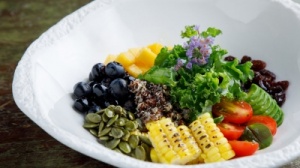Four Seasons Resorts in Thailand Embrace Plant-Based Menus to Cater to Health-Conscious Travelers

For more than two decades, the azure blue waters of Thailand’s southern islands, and the immersive culture of the north have made the “land of smiles” a sought-after destination for vacationers. “A robust rebound from post-pandemic geographies have seen a steady rise in travellers looking to return to some of their favourite holiday destinations across South-East Asia,” observes Sean Mosher, General Manager, Four Seasons Resort Chiang Mai and Tented Camp Golden Triangle. The allure of Thailand’s tropical beauty, diverse culinary experiences, and closely woven Southeast Asian cuisine culture makes it convenient for multi-generational families to travel at ease.
“From the perspective of catering to palates, the rise of plant-based menus represents a unique opportunity for us to attract new customers, appeal to a wider range of dietary preferences, and stay ahead of the curve in an ever-evolving culinary landscape. Plant-based foods are often high in fibre, vitamins, and minerals, making them a great option for our guests while inspiring creativity in our kitchens,” mentions Mosher.
A Green Theme
As a tropical country, the abundance of fresh greens and vegetables in Thailand means that most, if not all of the familiar ingredients, are available in Thailand. Similar to the variety of garden herbs and fresh aromatics used in Asian and Middle Eastern recipes, Thai cuisine too relies heavily on these very same Asian herbs and spices for its bouquet of flavours. “A significant number of travellers prefer a choice of flavourful and fresh produce-driven vegetarian cuisine based on their religious beliefs and personal preferences,” adds Jasjit Assi, General Manager at Four Seasons Resort Koh Samui. “It’s a reason why we have an additional emphasis on this aspect in the menus at our resorts.” Both Four Seasons Resort Chiang Mai and Koh Samui offer a comprehensive Live Well menu that is highlighted by vegan and vegetarian items on the menu.
Authentic Recipes
ADVERTISEMENT
At the forefront, fresh seasonal ingredients combine with classic Thai recipes that reflect the resorts’ efforts. “With the health-conscious traveller seeking new and varied experiences, the benefits of Thai cuisine’s low oil and fats, but rich in fresh herbs and fruits, are obvious,” feels Naruchit Taingtrong, Sous Chef and Thai cuisine specialist at Four Seasons Resort Chiang Mai. The added vibrancy of Thai cooking, with exotic aromatics such as lemongrass, Thai basil and galangal, appeals very much to most international palates. “The unique combination of sweet, sour, spicy and savoury makes Thai food especially attractive,” he continues. “While many Thai dishes lend themselves to non-vegetarian and seafood accents in the recipes, there are easy alternatives to retain the authenticity of the recipes,” adds Sumalee Khunpet, Chef de Cuisine at Four Seasons Resort Koh Samui who specializes in southern Thai cuisine. “We understand that many of our guests like comfort and lightly flavoured cuisine, and Executive Sous Chef Shanmuga Raja Ravi customizes menus to cater to the varied nationalities and their habits, in addition to Thai menus by Khunpet,” says Assi.
Must-Haves
“Curries are a cornerstone of Thai cuisine and ingredients such as tofu (bean curd), mushroom, cauliflower, yam and broccoli play a prominent role in these staples along with eggplant, beans, pumpkin and shallots,” shares Khunpet. Thai salads, such as Som Tam (green papaya salad) and Yam Woon Sen (glass noodle salad), often feature a combination of fresh vegetables, herbs, lime juice, chilli, and peanuts, which make for perfect vegetarian options. “In any restaurant, remember to ask for the ‘jay’ menu, meaning vegetarian,” smiles Taingtrong. Por Pia Thod Jay, (crispy spring roll) and Yum Som O Jay (spicy pomelo salad), for example, are favourites in Chiang Mai, while Koh Samui excels at the curries with a southern twist. “Like the Indian festival of Navarathri or Lent, Thailand also observes a week-long abstinence during the Vegetarian Festival in October every year,” Ravi comments. This gives rise to innovative creativity when working with a wide range of fruits and vegetables at your disposal.
Focused on Sustainability
By incorporating local ingredients into vegetarian cuisine, the resorts highlight the flavours of the region, support local agriculture, and provide guests with a truly sustainable dining experience. Keeping their fingers on the pulse of vegan culture allows the resorts to understand more about the needs and wants of this traveller community. It also allows chefs to be creative in the kitchen and come up with new tasty dishes that will keep vegan guests coming back for more.
“Vegetarian cooking requires a knowledge of a variety of plant-based ingredients with a good understanding of flavour combinations, and the ability to create balanced and satisfying meals without relying on meat as a central component,” explains Ravi, “This offers immense opportunities for culinary exploration, creativity, and the celebration of the diverse flavours and textures in vegetarian cuisine.”

